|
Click pictures for a larger version.
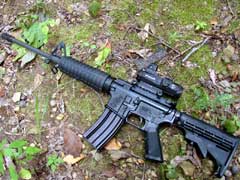
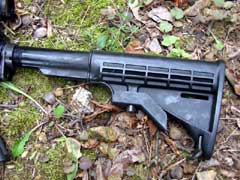
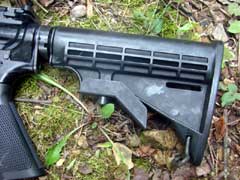
Six-position telescoping buttstock.
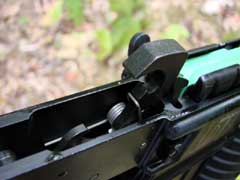
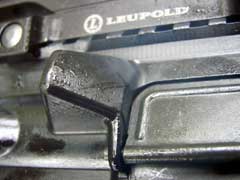
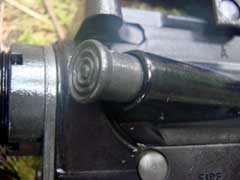
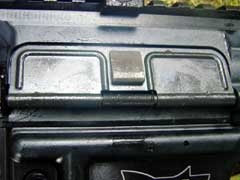
Case deflector (top), forward assist (center). ejection port dust cover
(bottom).
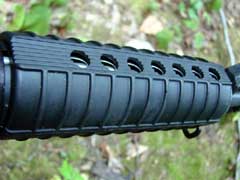
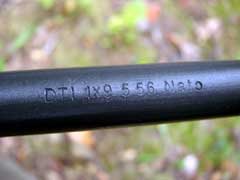
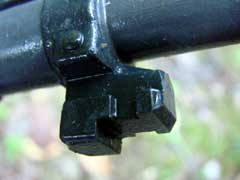
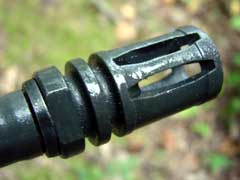
Bayonet lug (top), flash suppressor (bottom).
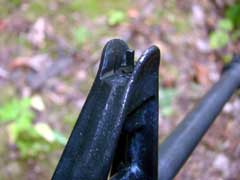
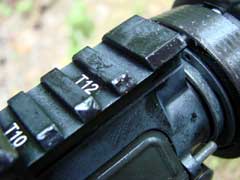
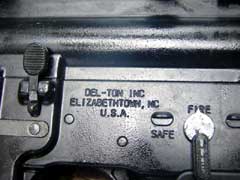
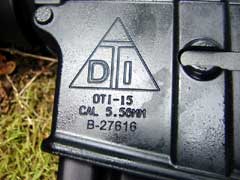
|
|
Back in January of this year, we reviewed the
then-new Del-Ton TRX rifle. That
rifle had many desirable features, and was tricked out with Troy
Industries furniture and accessories. The TRX was an excellent
rifle, but with all of the upgraded features, was priced above
what many are able to put into an AR-15. There is a large market
for a basic AR-15 that has all of the features that most
shooters deem necessary, such as a flat-top upper receiver,
forward assist, ejection port dust cover, and case deflector.
The carbine shown here is the Del-Ton DT Sport, and it has those
features, plus a flash suppressor, six-position buttstock, and a
bayonet lug, all at a price nearly half that of the TRX.
The DT Sport is built using the same high
quality forged hard-coated upper and lower receivers, but
instead of the more-expensive Troy furniture, it uses a standard
M-4 style buttstock and standard carbine (CAR) style hand
guards. The barrel of the DT Sport is a lightweight profile,
which I prefer. The only reason to have an M-4 profile barrel is
to mount a grenade launcher. Most of us do not have ready access
to a grenade launcher, and the machining for the M-4 profile
adds to the cost of the barrel. The straight tube of the DT
Sport eliminates that machining process. The barrel wears a
closed-bottom A-2 style flash suppressor at the muzzle. The DT
Sport barrel has a one-in-nine-inch right-hand twist, and is
sixteen inches in length. The barrel measures .598 inch forward
of the gas block. The trigger is mil-spec, and the pull measured
six and one-quarters pounds on my Lyman scale.
The hand guard of the DT-Sport is the short
CAR style, with internal heat shield. Some shooters prefer a
railed hand guard to mount a lot of accessories. I do not. I
prefer the comfort of a round or oval hand guard, and am not a
fan of hanging a lot of gear onto the rifle. The buttstock of
the DT Sport is adjustable, with six positions, to allow for
various shooter sizes and needs. Such a buttstock works very
well for young shooters, and allows the rifle to grow with the
shooter. It is also handy when wearing an equipment vest or
heavy clothing, and allows the carbine to be stored in a tighter
space than does a standard A-2 buttstock.
The DT Sport carbine is not available in New
York, New Jersey, Hawaii, Massachusetts, Maryland, or
California. Good. That means that it is a real AR-15 which has
not been neutered in any way. The DT Sport comes with one
thirty-round magazine, and will accept any AR-15/M-16/M-4
compatible magazine available. There is a bullet-button version
available for California residents.
Some modern versions of the AR-15 are too
heavy. The DT Sport is not. Staying with the original concept of
the AR-15/M-16, the DT Sport is light and handy. Weighing in at
slightly over six pounds (6 lbs. 1.1 oz.) on my scale, the Sport
balances well, and comes to the shoulder quickly. It is also
short enough to handle well in tight quarters, without
sacrificing reliability.
Besides saving weight, the DT Sport saves the
purchaser some real money, compared to the cost of many AR-15
carbines on the market. One does not have to spend in excess of
a thousand dollars to get a good rifle. It is just not
necessary. In fact, if I had no AR, I would rather have two of
these instead of one higher-priced piston gun with rails and
fancy furniture. That way, I could hand one off to a partner if
needed. Lots of folks are all into piston-operated AR-15 rifles
these days. There is nothing at all wrong with a piston gun, but
the direct-impingement (DI) gas system of the AR has been
working very well for many decades. The piston is just a
different way of slapping the bolt carrier to move it rearward.
The DI system is simpler, lighter weight, less expensive, and
works very well.
Saving several hundred dollars of the cost of
a high-end AR, the Sport sacrifices nothing. It still uses the
Del-Ton forged receivers of the more expensive rifles, and it
still has a flattop upper, to accommodate Picatinny and Weaver
compatible optical mounts. The Sport has an A-2 style post front
sight, which is compatible with many folding and fixed-position
detachable rear sights. Most shooters these days prefer to mount
an optical sight, as do I, and there are many great choices
available.
I fitted this DT Sport with one of my
favorite close to medium range optics; the Leupold HAMR. I
have reviewed the HAMR in depth, and refer the reader to that
review for details, but will just note that it is a rugged,
reliable, optically-clear sight with a dedicated reticle for
shooting the 5.56mm NATO cartridge out to several hundred
meters, with the addition of the Leupold DeltaPoint dot mounted
on top for close-range work. The HAMR is a high-end, no
compromises sight, and it mated perfectly in keeping with the
light, handy style of this DT Sport. However, it is not
inexpensive, and buyers of this carbine will likely be looking
for an less-expensive alternative. I often get requests to
recommend an affordable optical sight for an AR-15 for use by
folks who are on a budget. Many of those buyers choose an
imported knock-off of a modern high-quality battle optic, and
are disappointed. There is nothing at all wrong with mounting a
good sporting scope on an AR, and a quality Leupold Rifleman or
Redfield Revolution, even the lower-priced ones from a discount
seller, are still made in the USA, and guaranteed forever.
For accuracy testing, I mounted my mule, the
Leupold Mark 4 8.5 to 25 power target scope using an ArmaLite
one-piece mount. I try to use this same scope for all accuracy
testing of AR-15 rifles, to reliably evaluate the accuracy of
the rifle, with as little human error as possible. Velocity
testing was done with the chronograph set out twelve feet from
the muzzle at an elevation of 541 feet above sea level,
approximately. Temperatures hovered around the eighty-five
degree Fahrenheit mark during all testing, with eighty-eight
percent humidity. Velocity readings are the average of several
shots fired, and the results are listed in the chart below.
Velocity readings are listed in feet-per-second (fps). Bullet
weights are listed in grains. FMJ is a full metal jacket bullet.
HP is hollowpoint. V-Max is a polymer-tipped varmint bullet. TSX
is a Barnes Triple Shock homogenous copper hollowpoint bullet.
The handload listed uses the TSX bullet with 24.5 grains of
Ramshot TAC powder, a Remington small rifle primer, and
Winchester commercial .223 Remington cases. Accuracy testing was
done at a distance of one hundred yards, firing from a Target
Shooting, Inc. Model 500 rifle rest. Accuracy listed is the
average of five, three-shot groups fired at that distance. The
averages are listed below, with the best groups fired shown in
the pictures.
| Ammunition |
Bullet Weight |
Velocity |
Accuracy |
| Stryker V-Max |
55 |
2821 |
1.10" |
| Lake City SS109 |
62 |
2993 |
1.75" |
| Hand Load TSX |
62 |
2746 |
1.25" |
| Winchester USA FMJ |
62 |
2812 |
2.10" |
| Buffalo Bore HP |
77 |
2689 |
1.40" |
| Buffalo Bore HP |
69 |
2772 |
1.25" |
| Black Hills HP |
69 |
2536 |
1.17" |
| Wolf Gold HP |
75 |
2420 |
0.95" |
The DT Sport proved to be one hundred percent
reliable, as expected. The carbine fed, fired, and ejected every
cartridge perfectly. Accuracy was excellent, especially
considering the mil-spec trigger. I do much better work with a
match trigger, such as the Alexander or Timney,
but this carbine is built for fighting, and the trigger is
well-suited to that task. The AR-15 is a wonderful concept, and
Del-Ton executes it very well. The Del-Ton rifles are built very
well, and just because the DT Sport is one of the most
affordable AR-15 carbines available, does not mean that it
sacrifices on quality. The DT Sport has everything that you
need, and nothing that you donít. It performs as well as
rifles costing three times the price, and buying a basic rifle
such as this leaves a lot more cash to purchase a good optic,
plenty of extra magazines, and ammunition. You canít have too
much ammunition. The stuff keeps well, needs no refrigeration,
and several thousand rounds will fit neatly under your bed. Buy
it while you still can.
The Del-Ton DT Sport carbine currently has a
suggested retail price of only $699 US, as of the date of this
review.
Del-Ton is also a good source for AR
accessories, optics, and magazines.
Check out the DT Sport and other Del-Ton
rifles and accessories online at www.del-ton.com.
To order Del-Ton rifles online, go to www.galleryofguns.com.
To order quality 223 and 5.56x45mm ammo, go
to www.buffalobore.com,
www.theamericanmarksman.com
and www.luckygunner.com
Del-Ton rifles are built in North Carolina,
and have a lifetime warranty. With an ever-expanding line of
quality rifles, and for those who prefer a rifle with no front
sight post, Del-Ton will be introducing an optics-ready version
of the Sport in 2013.
Jeff Quinn
NOTE: All load data posted on this
web site are for educational purposes only. Neither the author nor
GunBlast.com assume any responsibility for the use or misuse of this data.
The data indicated were arrived at using specialized equipment under
conditions not necessarily comparable to those encountered by the
potential user of this data. Always use data from respected loading
manuals and begin working up loads at least 10% below the loads indicated
in the source manual.
  
Got something to say about this article?
Want to agree (or disagree) with it? Click the following link to
go to the GUNBlast Feedback Page.
|
|
Click pictures for a larger version.
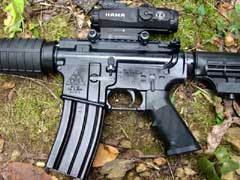
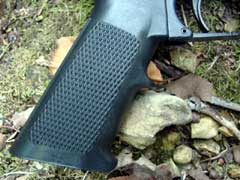
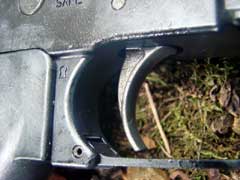
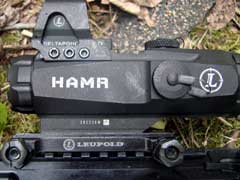
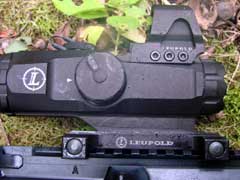
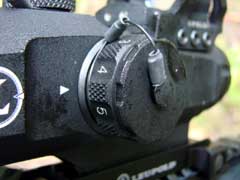
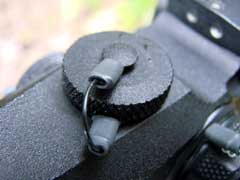
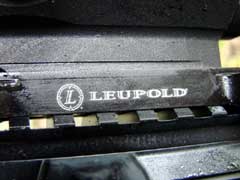
Leupold HAMR sight with DeltaPoint.
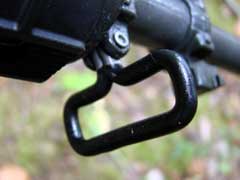
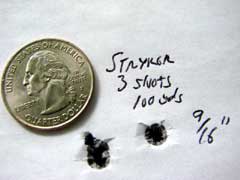
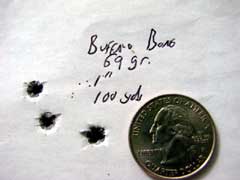
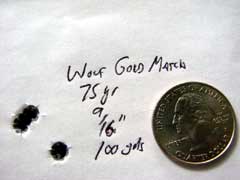
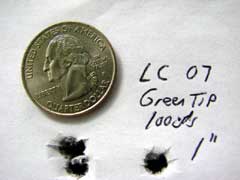
Best groups fired at 100 yards.
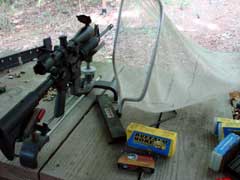
CTK Precision Universal Brass
Catcher.
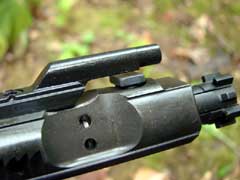
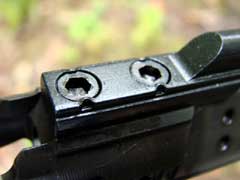
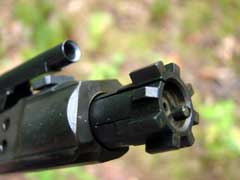
|
![]()